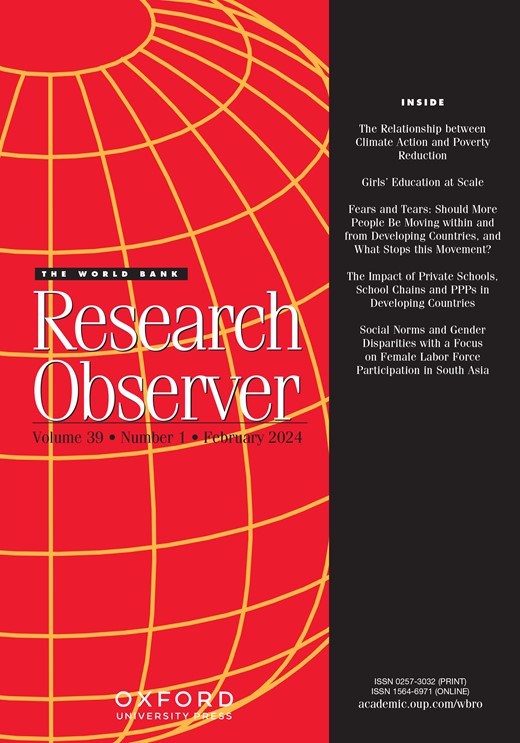Inside Decentralization: How Three Central American School-based Management Reforms Affect Student Learning Through Teacher Incentives
IF 3.3
1区 经济学
Q1 DEVELOPMENT STUDIES
引用次数: 26
Abstract
Despite decentralization reforms of education systems worldwide, there is little empirical evidence about the processes through which decentralization can improve student learning. Proponents theorize that devolving decisionmaking authority to the local level can improve communication, transparency, and accountability, making teachers and school principals more responsible for better performance and more capable of bringing it about. Yet some research has shown that decentralization can increase inequality and reduce learning for disadvantaged students. This article reports on retrospective evaluations of three Central American school-based management reforms. Using matching techniques, these evaluations investigate whether the reforms enhanced student learning and how they affected management processes and teacher characteristics and behaviors. The evidence indicates that all three reforms resulted in substantive changes in management and teacher characteristics and behavior and that these changes explain significant portions of resultant changes in student learning. This article contributes to the understanding of how decentralization reforms can improve learning and shows how education reforms, even when not conceptualized as affecting teacher incentives, can generate important changes for teachers that, in turn, affect student learning. Copyright The Author 2007. Published by Oxford University Press on behalf of the International Bank for Reconstruction and Development / the world bank . All rights reserved. For permissions, please e-mail: journals.permissions@oxfordjournals.org, Oxford University Press.内部分权:三个中美洲学校管理改革如何通过教师激励影响学生学习
尽管世界各地的教育系统都在进行权力下放改革,但很少有经验证据表明权力下放可以通过哪些过程改善学生的学习。支持者的理论是,将决策权下放到地方一级可以改善沟通、透明度和问责制,使教师和校长对更好的表现更负责,也更有能力实现这一目标。然而,一些研究表明,权力下放会加剧不平等,减少弱势学生的学习。本文报告了对中美洲三项校本管理改革的回顾性评价。使用匹配技术,这些评估调查了改革是否促进了学生的学习,以及它们如何影响管理过程和教师的特征和行为。证据表明,这三项改革都导致了管理、教师特征和行为方面的实质性变化,这些变化解释了学生学习结果变化的重要部分。本文有助于理解权力下放改革如何改善学习,并展示了教育改革(即使没有被概念化为影响教师激励)如何能够为教师带来重要变化,进而影响学生的学习。版权所有作者2007。牛津大学出版社代表国际复兴开发银行/世界银行出版。版权所有。有关许可,请发送电子邮件:journals.permissions@oxfordjournals.org,牛津大学出版社。
本文章由计算机程序翻译,如有差异,请以英文原文为准。
求助全文
约1分钟内获得全文
求助全文
来源期刊

World Bank Research Observer
Multiple-
CiteScore
12.60
自引率
1.20%
发文量
8
期刊介绍:
The World Bank Journals, including the Research Observer, boast the largest circulation among economics titles. The Research Observer is distributed freely to over 9,100 subscribers in non-OECD countries. Geared towards informing nonspecialist readers about research within and outside the Bank, it covers areas of economics relevant for development policy. Intended for policymakers, project officers, journalists, and educators, its surveys and overviews require only minimal background in economic analysis. Articles are not sent to referees but are assessed and approved by the Editorial Board, including distinguished economists from outside the Bank. The Observer has around 1,500 subscribers in OECD countries and nearly 10,000 subscribers in developing countries.
 求助内容:
求助内容: 应助结果提醒方式:
应助结果提醒方式:


